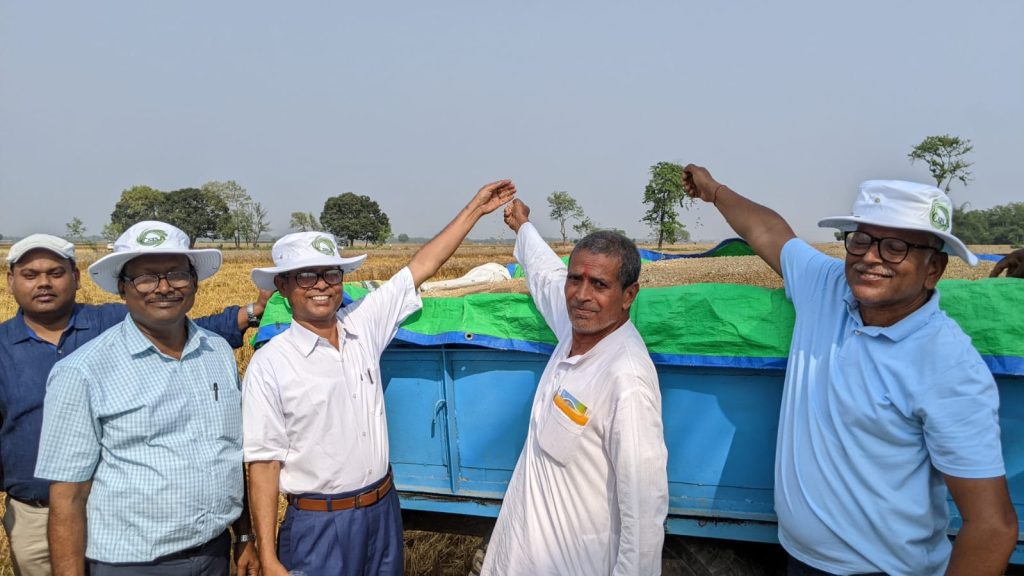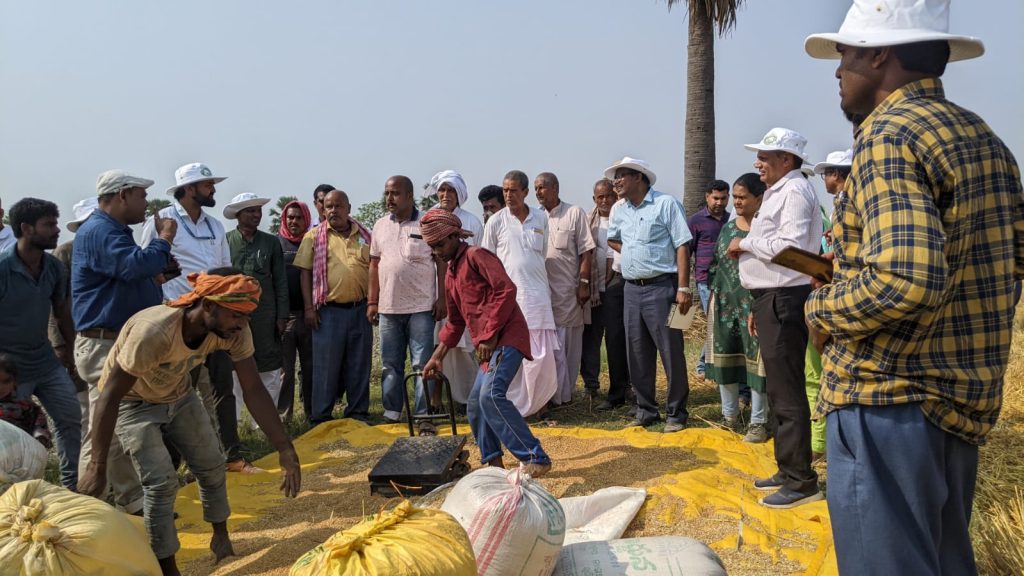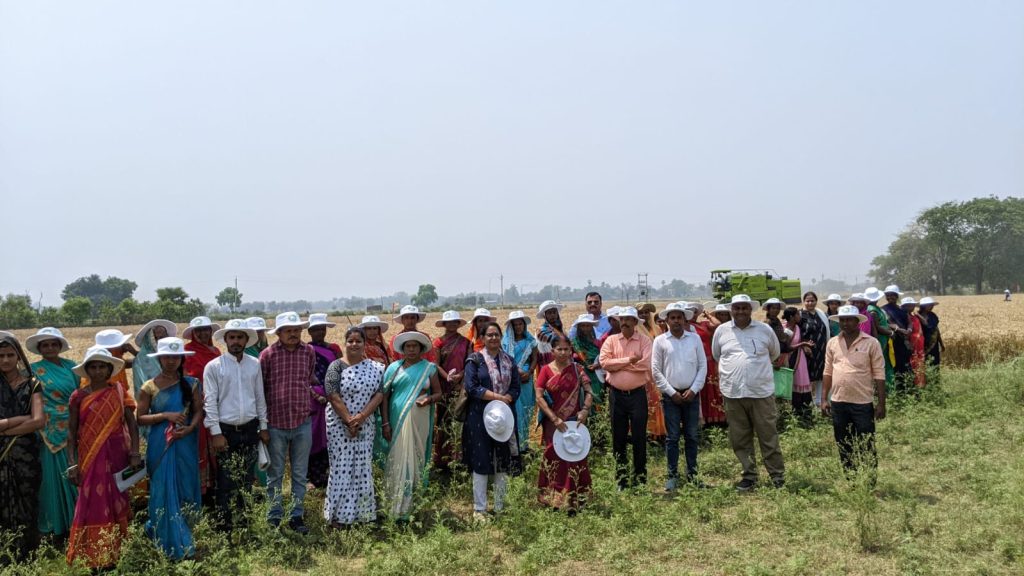Public harvesting sets the agenda for early sowing and timely sown wheat varieties in Bihar
Through sustained efforts, the CSISA-KVK network successfully promotes the adoption of Early wheat sowing (EWS) by smallholder farmers in the EIGP (Eastern Indo-Gangetic Plains)

A Public Harvesting event was jointly organized by the KVK Saraiya and Cereal Systems Initiative for South Asia (CSISA) in Sakari Chandpura village, Bandra block of Muzaffarpur district, Bihar, on 8th April. The event – on farmer demonstration plots – helped showcase the impact of early wheat sowing (EWS) on the performance of timely sown wheat varieties (DBW-187 and HD-2967). Timely sown wheat varieties (TSWVs) provided a higher grain yield than late sown wheat varieties (LSWVs). However, early sowing helped these varieties beat the terminal heat stress at harvest time. This has further helped break the yield barriers against the region’s perennial problem with wheat production. The participating farmers with officials gathered at the demonstration site of farmer Mr. Satish Dwiwedi could realize that EWS is more pivotal in realizing high yields. He has been an innovative farmer with the CSISA project for the past ten years and has been keen on applying Zero Tillage technology in his fields. On CSISA-KVK’s recommendation, he seeded wheat on 10th November with the help of ZT seed cum fertilizer drill.

EWS adoption in EIGP promoted by CSISA to beat heat stress
CSISA has advocated public harvest for the past many years as spending time and visualizing by participants can help decision-makers and even farmers take steps to achieve similar results from the technology under reference. At the site, farmers and stakeholders were present together, harvesting the entire plot, ensuring the most accurate production estimate, and creating confidence and trust among stakeholders. This approach also avoids our bias – at times – while selecting the crop cut areas. Wheat grain yield of 6.85 t/ha for variety HD 2967 and 6.7 t/ha for DBW 187 was recorded. That reflects a change towards better and sustained yield advantage of early sowing of timely sown wheat varieties. Since 2011 this change in mindset – acceptance of EWS – has started happening in Bihar and becoming more widespread with CSISA’s sustained efforts.
This year more emphasis was given to the participation of women farmers through JEEViKA. Such public harvest exercises have been conducted across important sites to convince the participants that early wheat sowing is non-cash input with a significant impact on wheat productivity. A discussion with participants followed the harvesting event. Nearly two hundred farmers, including women farmers from JEEViKA from the villages around, participated in the event. Dr. M. S. Kundu ( Director, Extension at DRPCAU – Dr. Rajendra Prasad Central Agricultural University), Pusa; Dr. K. K. Singh (Head, IARI research station); Mr. Shilajit Singh (District Agricultural Officer, Department of Agriculture); Mr. Anil Kumar Yadav (State Program Manager, JEEViKA); Dr. M. L. Meena, senior scientist and head KVK; and other senior officers of the Department of Agriculture ( DOA), Samastipur, and representatives from Bayer Crop Science and Dhanuka Agriteck, along with some NGOs participated in the event. CSISA team members Dr. Sonam Sherpa; Dr. S.P. Poonia; Ms. Sugandha Munshi; and Dr. Deepak Kumar attended the event organized by Dr. Pankaj Kumar, CSISA with Dr. Tarun Kumar, KVK partners.
During the discussion session organised after the harvesting event, participants shared their experiences and provided valuable feedback. While chairing the session, DRPCAU Director (Ext.) Dr. M. S. Kundu expressed his happiness over the wheat yield harvested at the site and asked the participating institutions to propagate the message of early wheat sowing adoption, zero tillage, and timely sown wheat varieties across the region.
Over the years, CSISA’s experience demonstrates that when such events are made public with farmers in the fields, it has paved the way for these farmers’ adoption of these technologies. The grain yield estimated through this process is transparent and visible. It brings the participants close to facts and adoption of the practices wholeheartedly. The CSISA-KVK network has used this process as a scaling-up strategy for early wheat sowing and achieved success across different sites.
CSISA has advocated public harvest for the past many years as spending time and visualizing by participants can help decision-makers and even farmers take steps to achieve similar results from the technology under reference. At the site, farmers and stakeholders were present together, harvesting the entire plot, ensuring the most accurate production estimate, and creating confidence and trust among stakeholders. This approach also avoids our bias – at times – while selecting the crop cut areas. Wheat grain yield of 6.85 t/ha for variety HD 2967 and 6.7 t/ha for DBW 187 was recorded. That reflects a change towards better and sustained yield advantage of early sowing of timely sown wheat varieties. Since 2011 this change in mindset – acceptance of EWS – has started happening in Bihar and becoming more widespread with CSISA’s sustained efforts.
This year more emphasis was given to the participation of women farmers through JEEViKA. Such public harvest exercises have been conducted across important sites to convince the participants that early wheat sowing is non-cash input with a significant impact on wheat productivity. A discussion with participants followed the harvesting event. Nearly two hundred farmers, including women farmers from JEEViKA from the villages around, participated in the event. Dr. M. S. Kundu ( Director, Extension at DRPCAU – Dr. Rajendra Prasad Central Agricultural University), Pusa; Dr. K. K. Singh (Head, IARI research station); Mr. Shilajit Singh (District Agricultural Officer, Department of Agriculture); Mr. Anil Kumar Yadav (State Program Manager, JEEViKA); Dr. M. L. Meena, senior scientist and head KVK; and other senior officers of the Department of Agriculture ( DOA), Samastipur, and representatives from Bayer Crop Science and Dhanuka Agriteck, along with some NGOs participated in the event. CSISA team members Dr. Sonam Sherpa; Dr. S.P. Poonia; Ms. Sugandha Munshi; and Dr. Deepak Kumar attended the event organized by Dr. Pankaj Kumar, CSISA with Dr. Tarun Kumar, KVK partners.
During the discussion session organised after the harvesting event, participants shared their experiences and provided valuable feedback. While chairing the session, DRPCAU Director (Ext.) Dr. M. S. Kundu expressed his happiness over the wheat yield harvested at the site and asked the participating institutions to propagate the message of early wheat sowing adoption, zero tillage, and timely sown wheat varieties across the region.
Over the years, CSISA’s experience demonstrates that when such events are made public with farmers in the fields, it has paved the way for these farmers’ adoption of these technologies. The grain yield estimated through this process is transparent and visible. It brings the participants close to facts and adoption of the practices wholeheartedly. The CSISA-KVK network has used this process as a scaling-up strategy for early wheat sowing and achieved success across different sites.
Field Day with Public Harvest, Patna

A similar field event was organized on 9th April in Nagwa village, Naubatpur block, Patna, Bihar. The selected plot for the demonstration was of farmer Ravi Ranjan who has been working on evaluating various conservation agriculture practices with CSISA for the past many years. The plot harvested was seeded with HD2967 through Zero Tillage. Due to moisture in the soil surface, seeding took place only on 20th November 2021. The yield, however, has been promising with 6.2 ton/hectare. Dr. Madhulika Singh, the CSISA scientist responsible for the event, successfully coordinated the proceedings with her colleagues.
The field event was joined by Dr. Kumari Sharda (Head, KVK Patna); Dr. Mrinal (Scientist, KVK Patna); Dr. Jyoti Sinha (Scientist, KVK Patna); Jitendra Kumar of Bayer Crop Science and Ranjan Kumar Singh from Bihar State Seed and Organic Certification Agency (BSSOCA), Village Resource Persons from JEEVIKA in the presence of scientists from CSISA led by Dr. Sonam Sherpa, Dr. S.P. Poonia and Dr. Deepak K. Singh with over seventy-two female JEEViKA farmers in participation. The CSISA-KVK’s campaign is now moving into a new phase where “time management” is implemented in the rice-wheat cropping system across IGP.
